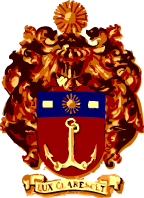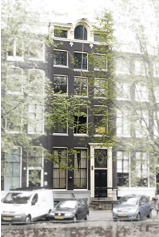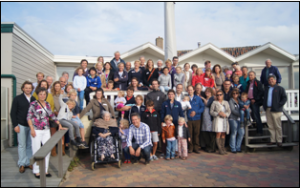The Netherlands has always been a nation of traders and merchants. Historically it has always welcomed hardworking foreigners. It is therefore no wonder that already in the early 16th century members of the Dutilh family settled in the country. In 1520 a certain Bertrand Dutilh was mentioned as a wine trader in Middelburg, importing wines from the Bordeaux area. Middelburg was at the time an important port in the south-east of the country specializing in trade with France and England.
Family-relationships
It is unknown whether people like Bertrand and other Dutilhs mentioned in these early documents were indeed related to the Clairac Dutilhs. However, we do know that in 1695, at the age of 20, Pierre Dutilh arrived by boat from Bordeaux (Clairac), in Amsterdam where he settled as a wine merchant. In addition to two daughters he had one son named Abel who joined his father’s trading firm “P. Dutilh and Son”. Abel bought a large house at the Keizersgracht in Amsterdam, where he and his wife Catherine Martin brought up ten children.
Like their ancestor, the male descendants of Pierre were quite adventurous and settled in different cities in Europe, around the Mediterranean and in the Americas. Lacking many sons we find in 1850 only male descendents from Pierre in Smyrna (Turkey) and Trieste (today in Italy). Presently Hendrik Dutilh (born in 1929) is the only male descendant of Pierre. Members of this branch have lived in Holland for only one generation in the 18th century, while they now have resided for more than 200 years in Izmir (formerly Smyrna, Turkey). Nevertheless they have always kept the Dutch nationality!
In 1718 Jacques Dutilh, a nephew of Pierre, went to Rotterdam at the age of 26, where he also settled as a wine merchant importing wine from the Bordeaux area. The off-spring of Jacques stayed mainly in the Netherlands. Until today a substantial proportion of the Dutch Dutilhs live in Rotterdam, although some branches have moved elsewhere to other cities such as Vlissingen and Amsterdam. In 2014 Rotterdam and Amsterdam are home to about an equal number of Dutilhs (between 15 and 20). Descendants of Jacques Dutilh in the male line are nowadays found in Brazil, USA and Vietnam. Today the Dutch Dutilhs number 86 (about equal numbers male/female) of which 21 live abroad.
Rather soon after the arrival in Amsterdam and Rotterdam, the family became part of the prosperous establishment as they had been in France. In the first two generations they married only French Protestant (Huguenot) women, like St Martin, Remy or Amalry. After that they also married into well-to-do Dutch bourgeois families.
Education and jobs
Initially most Dutilh-men in the Netherlands earned their living as merchants (wine, flax or black coal) or in the shipping business. In their late teens and early twenties the men often spent several years abroad as interns at related firms. There they learned not only the language of the country but also the business skills needed as an international merchant. It is also remarkable how frequently and widely they travelled at time that travel was still slow and often dangerous.
Since the mid-nineteenth century the first Dutilhs have attended the different Dutch Universities, initially to study law. Most of them still used this education to go on in business, but later they also became lawyers. ![]() One of the major law firms in The Netherlands is called NautaDutilh, but since the retirement of Ian Dutilh in 1982 family-members have not been involved in that firm.
One of the major law firms in The Netherlands is called NautaDutilh, but since the retirement of Ian Dutilh in 1982 family-members have not been involved in that firm.
Later other studies followed, like medicine, chemistry, psychology or theology. However, it took until the beginning of the 21st century before the first Dutilhs entered the scientific world, where several now work at the Universities in Groningen, Leiden, Nijmegen and Utrecht in The Netherlands, as well as in Campinas and Rio de Janeiro in Brazil and in Basel in Switzerland.
You will rarely find any Dutilhs in the military or in the civil service nor in education or in the financial world (with the odd exception). Various family members were involved in local politics. They always have been and still are active in a wide variety of cultural and charitable organizations.
Family-traditions
As a relatively small family, the members have always been in fairly close contact with each other. Regular family reunions and many celebrations of festive occasions are shared with others Dutilhs. In difficult times family members do assist each other.
In Rotterdam there was a family-tradition that on January 1st family-members went to the house of the “pater familias” to wish each other a happy new year. That tradition still exists today although today the venue for this reunion is at home with one of the family-members, anywhere in the country.
Most family-members share a love for France. That country is a favourite for holidays and several have bought vacation houses in Southwest France. When in France it is very tempting to visit the ancestral city of Clairac to discover the places where our ancestors lived and worked. In the Netherlands “Bergen aan Zee” is the family’s favourite beach town. Three branches of the Dutilhs have a cottages in this town where they have spent numerous happy vacations for over a century.
For generations the family has been very interested in genealogical research. Many hand-written documents exist in which family-members try to find out how they are linked not only to their French relations but also to the British and American Dutilhs. A large number of family-documents were collected by Christian Corneille Dutilh (1852-1931) and his son Jacques (1884-1960). Not only did they collect family documents themselves but in the 1930s they also hired professional French genealogist to visit archives, churches and libraries to collect relevant material. This collection of at least one cubic meter of mostly original and unsorted material was kept in the house of Jacques in Rotterdam. Before any of these papers could be studied or copied his house was lost during the bombardment by the Germans on May 14th 1940. The house and the family treasures were completely lost. Fortunately the occupants survived. After the war the search for family information was been taken up by Aak the youngest son of Jacques.
Around 1960 Aak had collected so many documents that it became necessary to house them in a more professional manner. He contacted the Rotterdam municipal archive, which was most interested in safeguarding the collection. Hence the main body of the Dutilh family archive is now kept there.
In the Netherlands the ‘Centraal Bureau voor Genealogie’ (Central Bureau for Genealogy – CBG) is the information and documentation centre for genealogy, family history and related sciences. Since 1910 that organisation annually publishes genealogies of approximately ten prominent Dutch families in a series titled Nederland’s Patriciaat (NP). The first Dutilh genealogy was published in volume 6, issued in 1915. Since then two more times an updated genealogy has been published in NP in 1955 and 1984. It is our intent to submit another updated version for volume 95 which will be published in 2015. Few families have updated their family trees as conscientiously as the Dutilhs. It shows the family’s continuing interest in family history especially since there are stringent rules for inclusion in the NP as to the form and quality of the genealogical research.
Family-foundation and communications
While Aak was trying to find a home for the archives other family members expressed a desire to create a formal family association with as its goal the nurturing of the family ties. The result was the establishment of the Dutilh Family Foundation in 1962. Since 1969 the Foundation has issued at the occasion of the New Year’s Day Reunion a magazine called the Dutilhiteiten (about the Dutilhs). This magazine contains both current and historical family news, birth, marriage and death announcements, gossip, photos and other titbits.
On January 1st 2014 the 46th volume of no less than 62 pages saw the light of day. The last few years the number of articles in English is growing and now makes up about 25% of its content. In the future we intend to further extend the international accessibility by creating a Dutilh.com website in English. News about the progress of the effort may be found from time to time on this same website.


